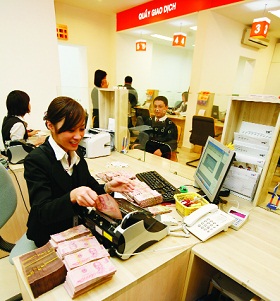Credit market growth brings uneasy feeling
Unprecedented credit market movements are making the banking sector nervous. According to the State Bank’s latest monthly report, outstanding loans expanded by 1.86 per cent in May, 2010.
 Corporate borrowers are en masse shifting to borrow in dollars for lower rates |
Vo Thi Sanh, vice head of BIDV’s Treasury Department, called this development “a distortion” of the credit market. “Corporate borrowers are en masse shifting to borrow in dollars rather than Vietnamese dong for lower rates.
But, this might lead to market turbulence by end of 2010. When the dollar-denominated loans are due, corporate borrowers without dollar income would have to buy dollars from the banking system or even unofficial market,” said Sanh.
At the moment, Vietnamese dong lending rates stand at around 13-14 per cent, per year while dollar lending rates were just around 4-6 per cent, per year. “However, the State Bank has requested local lenders set a watchful eye on dollar loans,” said Sanh.
In mid-May, the State Bank requested local banks and financial companies to report their dollar-denominated mobilisation and lending activities aiming to help the country reduce trade deficit and improve balance of payments.
Over the first five months of 2010, the country’s trade deficit hit $5.37 billion, accounting for 20.8 per cent of total exports, from $1.1 billion in the same period last year.
Nguyen Dai Lai, vice head of Credit Information Centre, said that lending rate gap had encouraged corporate borrowers to borrow in dollars then sell these amounts for Vietnamese dong, leading to tremendous leap in dollar loans.
However, the State Bank said in a recent report that domestic forex market had been stabilised since late March with a profuse supply of greenbacks. The World Bank last week predicted that Vietnam would end 2010 with a $2.6 billion surplus in its balance of payments versus a deficit of $8.8 billion in 2009.
Martin Rama, the World Bank’s chief economist, said that the confidence in the Vietnamese dong had improved, given the narrowing gap between official and free-market forex rates, calling on the State Bank to boost its dollar purchases to enrich national forex reserves.
“Boosting the money supply could put pressure on the dong, leading to a further devaluation of the currency,” Rama added. In fact, the Vietnamese government has devalued the dong by 6.4 per cent against the US dollar since last November.
What the stars mean:
★ Poor ★ ★ Promising ★★★ Good ★★★★ Very good ★★★★★ Exceptional
 Tag:
Tag:
Latest News
More News
- Citi sharpens its focus on institutional banking (February 09, 2026 | 19:58)
- SSC steps up engagement with FTSE Russell on market reforms (February 09, 2026 | 17:33)
- IFC considers $50m trade finance guarantee facility for Nam A Bank (February 09, 2026 | 17:28)
- Hoa Phat Agricultural Development debuts shares on HSX (February 06, 2026 | 14:00)
- Vietcap’s VAD 2026 draws strong global investor turnout (February 06, 2026 | 13:30)
- New rules ease foreign access to Vietnam equities (February 05, 2026 | 17:29)
- 0.1 per cent tax proposed on each transfer of digital assets (February 05, 2026 | 17:27)
- Ministry of Finance tightens policy delivery at start of year (February 05, 2026 | 17:26)
- Vietnam steps up market reforms as FTSE Russell reviews upgrade progress (February 05, 2026 | 17:20)
- 2025 profits mixed amid strong energy and farming results (February 05, 2026 | 17:18)
















 Mobile Version
Mobile Version